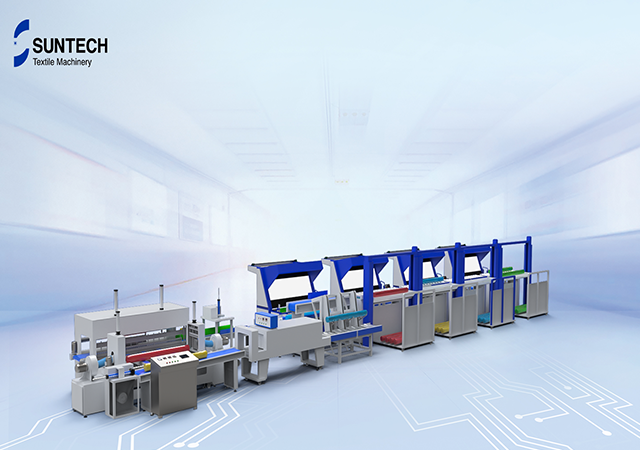As new trends continue to redefine the consumer landscape, suppliers must consider how to stay relevant and secure more orders. In particular, the textile and apparel industry, catering to a broad consumer base, is uniquely positioned to align with these emerging consumption patterns.
Automation as a Solution:
One widely acknowledged strategy in the textile industry to navigate these evolving trends is automation. Automation not only enhances efficiency but also helps reduce labor costs. Automated packaging lines are a pivotal element in this transformation. They streamline the packaging process, offer consistency, and reduce manual errors. To better understand who stands to benefit most from automation, consider the following factors:
Diverse Product Range: If your factory produces a wide variety of products, it's wise to invest in an automated packaging line. These systems not only automate the entire packaging process but also provide efficient product categorization through automated sorting functions.
Large-Scale Operations: Medium to large-scale textile and weaving enterprises can significantly benefit from automated cloth inspection and packaging lines. These machines often replace the work of multiple employees, can operate round the clock, and significantly reduce the possibility of errors arising from manual shifts.
Repetitive Packaging Processes: In cases where packaging processes are simple and repetitive, automation shines by improving efficiency and consistency.
Customized Orders: For factories handling multiple batches of customized orders, automation can be a game-changer. It allows machines to efficiently process small, custom orders, making the factory more competitive and adaptable.
Rising Labor Costs: With labor costs on the rise globally, automated cloth inspection and packaging lines offer not only efficiency but also demonstrate a commitment to complying with labor laws and providing a safe working environment for employees.
Seeking High ROI: Every factory strives for a higher return on investment. Fully automated cloth inspection and packaging lines not only enhance packaging efficiency but also significantly reduce waste and minimize manual errors, thus safeguarding against losses and increasing ROI.
In the textile industry, inflexibility in packaging options during various production stages can have a profound impact. This is often due to manual processes or outdated equipment, resulting in several challenges:
Human Error: Manual packaging processes are prone to human error, leading to inconsistencies and defects in the final product.
Outdated Machinery: The use of outdated or unstable machinery can hinder the packaging process, resulting in inefficiencies, slower production, and reduced quality.
Quality Impact: Poor packaging quality can compromise the protection of materials, leading to business consequences in terms of customer satisfaction and returns.
Material Waste: Inflexible processes contribute to higher material waste, leading to increased production costs and environmental concerns.
Operator Dependency: Manual processes require higher availability from operators, and any negligence or mistakes can result in significant errors, product damage, and time wastage.

Efficient Planning for Automation:
Reduced Manual Labor: Automation machines offer impressive speed, consistent quality, and reduced labor requirements. Advanced technologies, such as sensors and robots, minimize errors and optimize the packaging process.
Integrated Functions: Modern automated machines combine various functions, such as AI inspection, automatic labeling, packing, and smart sorting. They can be tailored to different packing requirements, enhancing production efficiency.
SUNTECH's Automatic Packaging Machine represents a cutting-edge solution in the textile industry. It reimagines fabric inspection and packaging, merging these processes into a single automated workflow. The advantages are numerous:
Full Automation: SUNTECH's fabric inspection machine detects defects, classifies them based on their severity, and can take corrective measures automatically. It is compatible with a wide range of fabrics, including cotton, linen, silk, wool, synthetic materials, and blends.
High Efficiency: These machines significantly outperform manual fabric inspection, with over 95% accuracy in defect detection, far surpassing manual inspections. The miss and misjudgment rates are less than 5%, ensuring consistently high quality.
Variable Speeds: SUNTECH's automatic fabric inspection systems offer adjustable speeds, catering to different fabric widths and defect types. This adaptability streamlines the production process.
Automatic Length Calculation and Review: The system automates length calculations and reviews seams, eliminating the need for manual inspections and marking. This not only increases efficiency but also enhances accuracy and consistency.
Staying attuned to emerging trends and embracing automation in the textile industry are essential steps to meet changing consumer demands and enhance operational efficiency. The implications of inflexible packaging options underscore the need for modernization, while SUNTECH Textile Machinery's automation solutions offer comprehensive benefits for textile factories, promising increased efficiency, reduced waste, and improved product quality. This forward-looking approach is vital for thriving in the dynamic landscape of the consumer goods industry.




